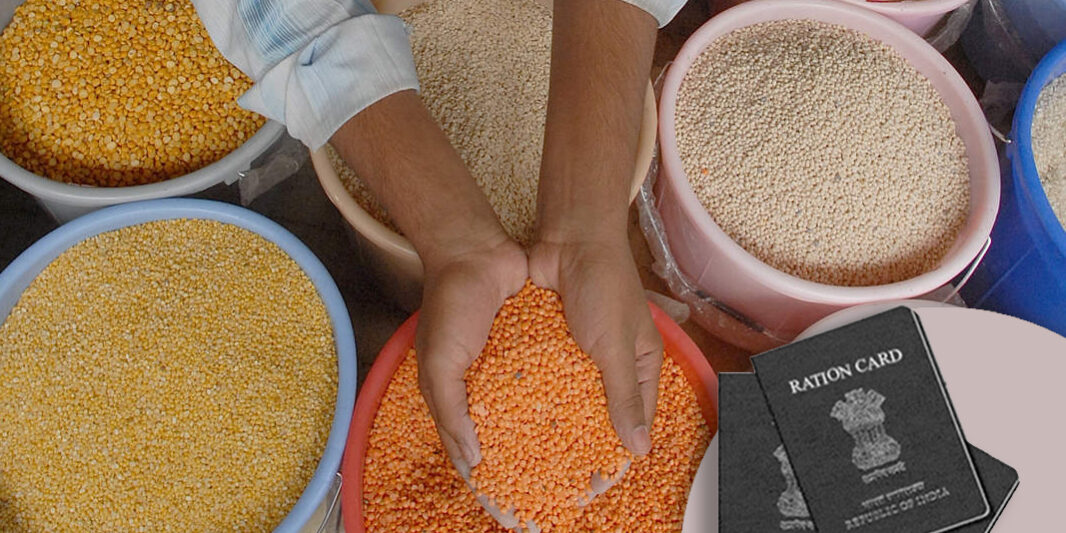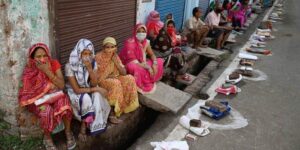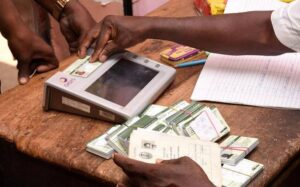From the moment the national Covid-19 lockdown was announced, the unprecedented nature of the humanitarian crisis that was likely to follow was clear. It was also certain that the ranks of the vulnerable would rapidly start to swell as wages and work were withdrawn
Once the lockdown was in force, there was no doubt that the central and state governments would have to act quickly to ensure that at the very least two things food and cash reached the most vulnerable.
Without the basic cover that the overwhelmingly informal economy provided, many more Indians would have to depend on the state for relief and support to get through this uncertain time.
The scheme of “ONE NATION, ONE RATION CARD ” was to ensure that the poor do not go hungry irrespective of where they are that the department had launched the scheme, which offered nationwide portability of ration cards, on a pilot basis in clusters of two states.
Ration card portability is aimed at providing intra-state as well as inter-state portability of ration cards.
What is the one ‘One Nation, One Ration Card’ system?
- Under the National Food Security Act, 2013, about 81 crore persons are entitled to buy subsidized food grain.
- Rice at Rs 3/kg, wheat at Rs 2/kg, and coarse grains at Re 1/kg — from their designated Fair Price Shops (FPS) of the Targeted Public Distribution System (TPDS).
- Currently, about 23 crore ration cards have been issued to nearly 80 crore beneficiaries of NFSA in all states and UTs.
How will the system of ration card portability work?
Ration card portability is aimed at providing intra-state as well as inter-state portability of ration cards.
While the Integrated Management of Public Distribution System (IM-PDS) provides the technological platform for the inter-state portability of ration cards. It enables a migrant worker to buy food grains from any FPS across the country.
The Annavitran portal enables a migrant worker or his family to avail the benefits of PDS outside their district but within their state. While a person can buy his share of food grains as per his entitlement under the NFSA, wherever he is based, the rest of the family members can purchase subsidized food grains from their ration dealer back home.
One Nation, One Ration Card System been in the Implementation?
The government launched a scheme called Integrated Management of Public Distribution System (IM-PDS) in April 2018 to reform the public distribution system in the country.
The Central government announced a ‘one nation, one ration card’ scheme to allow national portability of ration cards for the people, who can now avail the benefits under the PDS system wherever they are in the country.
Presently, out of the total given the coverage of 81.35 crore persons under the NFSA, around 80 crore beneficiaries are receiving their entitled quota of food grains through the public distribution system (PDS) on monthly basis.
The PDS system was marred with inefficiency leading to leakages in the system. To plug the leakages and make the system better, the government started the reform process.
For, this purpose it used a technological solution involving the use of Aadhaar to identify beneficiaries. Under the scheme, the seeding of ration cards with Aadhaar is being done.
Simultaneously, PoS machines are being installed at all FPSs across the country. Once 100 percent of Aadhaar seeding and 100 percent installation of PoS devices is achieved, the national portability of ration cards will become a reality.
It will enable migrant workers to buy foodgrains from any FPS by using their existing/same ration card
Challenges of design and implementation
The ‘One Nation, One Ration Card’ will mostly assist seasonal and circular migrant workers to have better access to PDS, both, at source and destination. The authorities can be expected to encounter hard-hitting ground realities for designing and implementing the scheme.
- The first hurdles will be to have exact data on the mobility of poor households migrating to work.
- The domicile-based legislation for accessing government schemes and social security needs serious rethinking before making ‘One Nation, One Ration Card’ portable.
- NFSA defines food security as nutritional security. Therefore, the portability of Integrated Child Development Services, Mid-Day Meals, immunization, health care, and other facilities for poor migrant households can’t be neglected and should be made portable.
- Thirdly, the ‘One Nation, One Ration Card’ is based on two important guiding principles:
Aadhar and digitalization of ration cards. It is feared that both Aadhar and digital ration card may exclude either a person who migrates alone or migrates with his family or the left-behind vulnerable family member who stays back in the village.
- The Rashtriya Sawthya Bima Yojna (RSBY), the national health insurance scheme of the Indian government, had an interesting component of splitting the unique insurance card to help both migrants and those left behind.
- This component from RSBY may be adopted in devising PDS access to both migrants and those left behind. Moreover, Aadhar seeding and the biometric authentication of eligible migrant workers at the destination may create obstacles for hassle-free access to PDS both, at source and destination.
- There are multiple social security, welfare, food, and anti-poverty schemes in India, in addition to an array of labor laws.
- Every state has its own rules for the Public Distribution System (PDS).
- If ‘One Nation, One Ration Card’ is implemented, it may further boost corruption in an already corrupted Public Distribution System.
- The scheme may increase the woes of the common man as the middlemen and corrupt PDS shop owners may exploit them.
- Within some states, there are issues of intrastate portability.
- Different states have different rates and this mismatching rate will be a big challenge.
- The poor and vulnerable population is more mobile today in searching for better livelihoods, wages, and opportunities for their families beyond their native villages.
They certainly need better access to both, welfare and labor laws to protect their rights and entitlements.
The panel has identified 54 districts, many of which in Uttar Pradesh, Bihar, Jharkhand, and Madhya Pradesh, which account for half the inter-state male out-migration. The report states that migrant workers constitute 38 percent of the male manufacturing workforce in urban areas. Its findings also show that women, who list marriage as their main reason for migration, are increasingly joining the workforce in urban India. Most importantly, the findings show an accelerating urban to urban movement.
The way forward
It is evident that beneficiaries have utilized intrastate portability more than interstate. However, a shift towards a national rollout of ‘One Nation One Ration Card’ will need a lot of work across participating states and at the center, for which the government will have to ensure the following:
- Fix strict timelines for the digitization of PDS and the Aadhaar seeding of the PDS database.
- Adopt the best practices from states which have effectively automated their PDS and draft guidelines on fixing the timelines for the uptake of food grains by beneficiaries, stock reconciliation, and on FPS dealer’s request for extra food grain stocks.
- The government should explore ways to compensate the FPS dealers through a model with a fixed and a variable component for their commission.
- Respective state governments should assess the data on intrastate portability transactions and optimize the locations of FPS.
- Awareness regarding interstate portability and its operational details should be effectively communicated to beneficiaries through SMS, posters at FPS, and imparting of information through FPS dealers.
While adopting the above measures with regards to portability, it should further be implemented in a phased manner across India prioritizing states with a high migrant population.
One nation, one ration card: covid 19 crisis
- Recently the Supreme Court (SC), asked the Union government to examine the feasibility of implementing the “one nation one ration card” (ONORC) scheme during the national lockdown.
- The scheme, which allows beneficiaries to access food grains that they are entitled to under the National Food Security Act, 2013, from any fair-price shop in the country, was announced last June.
- The SC’s nudge to expedite the ONORC is critical. Millions of out-of-work migrant workers are stuck in host cities due to the lockdown.
- Many have run out of money to buy food and don’t have proof of identity like ration cards to access subsidized food grains via the well-stocked public distribution system (PDS).
- States, where they are stuck, prefer offering relief to their own residents first and cite the lack of identity documents to deny benefits.
- And among those states which have opened community kitchens for out-of-job migrant workers, there have been complaints of the quantity, quality, and type of food.
- Some feel that the ONORC scheme will not be of much help during the present crisis since many migrant workers have left their PDS cards in their villages.
- Instead, the Union government must expand the well-stocked PDS system to cover all individuals, irrespective of whether they have a ration card or not, for at least six months.
Conclusion:
The current migrant crisis should be seen as an opportunity to develop a national migration policy addressing the challenges faced by migrant workers’ productivity, living conditions, and social security.
While this must be done, the government must also fast-track the ONORC scheme because India’s present rights-based regime is based on the assumption that people are sedentary.
This is not true given the high rates of inter-and intra-state migration. Without any safety net, migrants depend either on their employers or labor contractors for food provisions or purchase food in the open market.
This increases their cost of living and reduces the additional earnings they might hope to remit to their families. During the lockdown, the crisis has become even more acute.
But even after the coronavirus pandemic is over, this will be useful. Migration is bound to restart because of unemployment.
When migrant workers again start boarding trains and buses for the destination cities, they must have their PDS cards that are valid across India with them.










